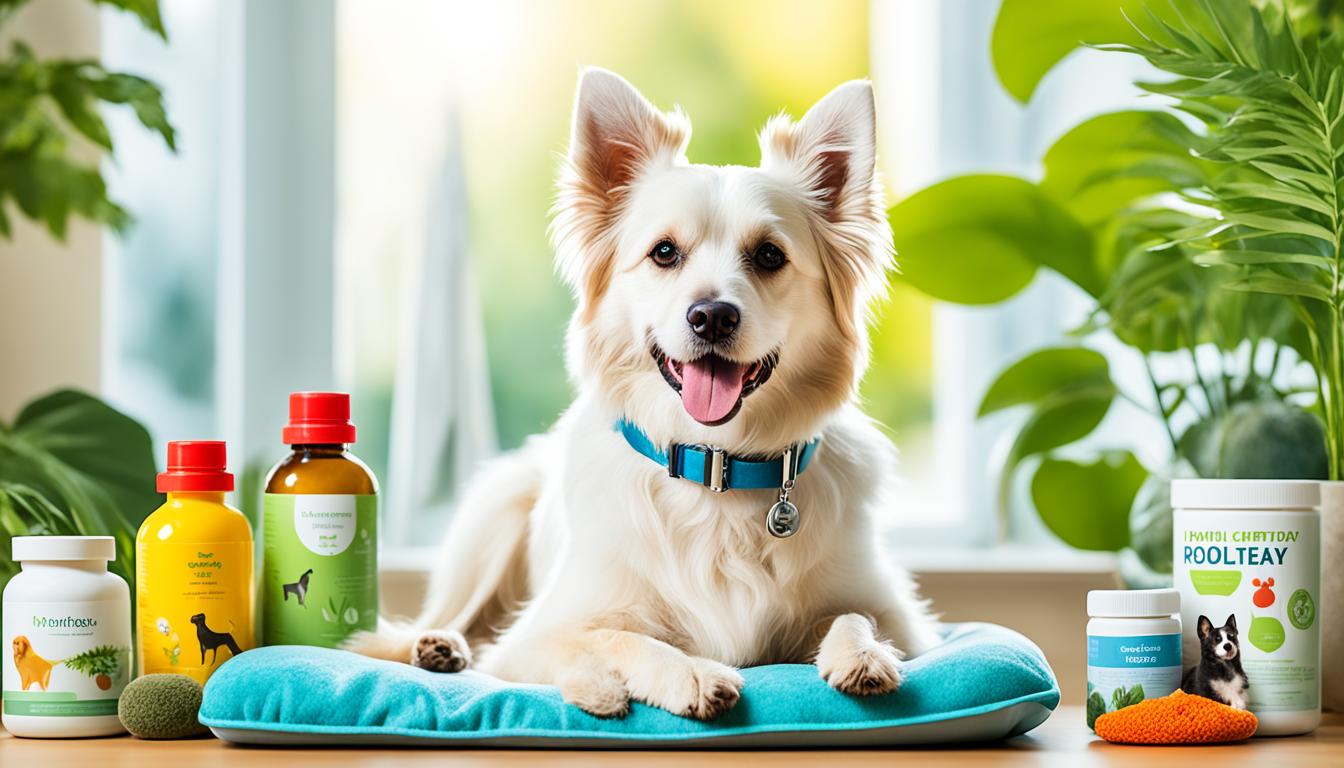As your beloved pet ages, their health needs change. Understanding and addressing the impact of age on your pet’s health is crucial to ensuring they live a happy and healthy life in their golden years. Caring for senior pets requires special attention and tailored care to meet their unique needs. In this article, we will provide you with essential pet health and wellness tips for senior pets, covering various aspects of their care, including nutrition, exercise, preventive measures, common health concerns, veterinary care, behavior and environmental modifications, integrative and holistic approaches, mental stimulation, and creating a supportive environment.
Key Takeaways:
- Understanding the changing needs of senior pets is essential for their overall well-being.
- Proper nutrition plays a crucial role in maintaining the health of senior pets.
- Regular exercise is important for keeping senior pets active and maintaining their physical health.
- Preventive care, including vaccinations and regular check-ups, can help detect and address health issues early.
- Integrative and holistic approaches, such as natural remedies and alternative therapies, can enhance the well-being of senior pets.
Understanding Aging in Pets and Its Effects
As our beloved pets age, it is important to have a comprehensive understanding of how the aging process affects them. Aging in pets, just like in humans, is a complex phenomenon influenced by various factors. By understanding the biopsychosocial model of pet aging and comparing it to human aging, we can gain valuable insights into their health and well-being in their senior years.
The Biopsychosocial Model of Pet Aging
The biopsychosocial model of pet aging recognizes that the aging process in pets is not merely a result of biological changes, but is also influenced by psychological and social factors. This model emphasizes the interconnectedness of these aspects in determining the overall health and happiness of senior pets.
Biological factors include age-related changes in organ function, hormonal imbalances, and increased susceptibility to diseases. Psychological factors encompass cognitive function, emotional well-being, and the ability to adapt to age-related changes. Social factors refer to the pet’s social environment, the support they receive from their human companions, and their access to veterinary care.
By considering these biological, psychological, and social factors, pet owners can develop a holistic approach to caring for their aging pets, ensuring their overall well-being and quality of life.
Comparative Insights: Human Aging vs. Pet Aging
Comparing human aging with pet aging provides valuable insights into the similarities and differences between the two processes. Although there are variations, certain aspects of aging are shared between humans and pets.
Similarities between human aging and pet aging include:
- Physical changes: Both humans and pets experience age-related physical changes such as decreased mobility, changes in sensory functions, and an increased risk of developing chronic conditions.
- Cognitive decline: Both humans and pets may experience cognitive changes as they age, including memory loss and reduced cognitive function.
- Emotional well-being: Older humans and pets may experience changes in emotional well-being, such as increased anxiety or depression.
However, it is important to note that there are also significant differences in the aging process between humans and pets. For example, the lifespan of pets is generally shorter than that of humans, which means that pets may age more rapidly and experience age-related health issues at an earlier stage of their lives.
Understanding these comparative insights can help pet owners tailor their care and support to meet the specific needs of their aging pets, promoting their health and well-being throughout their senior years.
| Aspect | Similarities | Differences |
|---|---|---|
| Physical changes | Both humans and pets experience age-related physical changes such as decreased mobility and sensory functions. | The lifespan of pets is generally shorter than that of humans, leading to more rapid and early onset of age-related physical issues. |
| Cognitive decline | Both humans and pets may experience cognitive changes as they age, including memory loss and reduced cognitive function. | The extent and pace of cognitive decline may differ between humans and pets. |
| Emotional well-being | Older humans and pets may experience changes in emotional well-being, such as increased anxiety or depression. | The specific emotional challenges faced by humans and pets may vary. |
Recognizing the Signs of an Aging Pet
Recognizing the signs of aging in pets is essential for early detection of health issues and timely intervention. As your pet enters their senior years, it’s important to be vigilant and observant of any changes in their behavior, energy levels, mobility, and sensory functions.
Aging indicators in pets can manifest in various ways. You may notice that your pet is becoming less active or has a decreased appetite. They may also experience difficulty with movement, such as stiffness or limping, indicating potential joint or muscle issues. Additionally, changes in vision, hearing, or cognitive function can be signs of aging in pets.
It’s crucial to pay attention to any unusual behaviors or physical changes in your pet, as these can be indicative of underlying health concerns. By recognizing these signs early on, you can seek the appropriate care and support to maintain your senior pet’s health and well-being.

Pet Health and Wellness Tips for Optimizing Senior Life
As our pets age, they require special care to ensure their health and wellbeing. In this section, we will provide you with valuable tips and strategies to optimize your senior pet’s quality of life.
Nutritional Adjustments for Senior Pets
One of the most important aspects of senior pet care is making appropriate nutritional adjustments to meet their changing dietary needs. Older pets may require diets that are lower in calories, but higher in essential nutrients such as protein and omega-3 fatty acids. Consult with your veterinarian to determine the best senior pet food options and feeding schedules for your furry friend.
Routine and Preventive Care Strategies
Regular veterinary check-ups are essential for senior pets to detect and treat any health issues at an early stage. Schedule routine appointments with your veterinarian to monitor your pet’s overall health and discuss preventive care measures. This may include vaccinations, dental cleanings, and parasite prevention. Additionally, ensure that your senior pet receives age-appropriate exercise to maintain muscle tone and joint mobility.
Senior pet hygiene and grooming are also vital for their well-being. Regular brushing and dental care can help prevent dental disease and keep their coat clean and free from matting. If necessary, consider scheduling professional grooming services to maintain their hygiene and appearance. Additionally, provide a comfortable and accessible living space for your senior pet, ensuring they have easy access to food, water, and their favorite resting areas.
By following these pet health and wellness tips, you can ensure that your senior pet enjoys a happy and comfortable life. Remember to consult with your veterinarian for personalized advice and guidance based on your pet’s specific needs.
Common Health Concerns for Older Pets
As your pet enters their senior years, it’s important to be aware of the common health concerns that can affect them. By understanding and addressing these issues, you can ensure your senior pet’s overall well-being and provide them with the necessary care and treatments.
Arthritis and Mobility Issues
Arthritis is a common health condition in senior pets, causing pain, stiffness, and reduced mobility. It can affect their ability to walk, jump, and play. Regular exercise, joint supplements, and medications prescribed by your veterinarian can help manage arthritis and improve your pet’s mobility. Providing a comfortable and supportive environment with orthopedic beds and ramps can also alleviate joint stress.
Dental Health and Its Importance
Dental health is crucial for your senior pet’s overall well-being. As they age, dental diseases such as periodontitis and tooth decay can lead to pain, infections, and systemic health issues. Regular dental check-ups, professional cleanings, and daily toothbrushing or dental treats can help maintain their oral health. Additionally, feeding a balanced diet that promotes dental health, such as dental kibble or dental chews, can help keep their teeth clean.
Cognitive Changes and Mental Health
Just like humans, senior pets may experience cognitive changes and mental health issues as they age. They may show signs of confusion, disorientation, memory loss, and changes in behavior. Providing mental stimulation through interactive toys, puzzle feeders, and regular training sessions can help keep their minds active. Consult with your veterinarian about medications or supplements that can support cognitive function in senior pets.

Senior Pets: The Importance of Veterinary Care
Regular veterinary care is crucial for the health and well-being of senior pets. As pets age, their bodies go through various changes that can make them more susceptible to certain health issues. Routine health exams and screenings play a vital role in monitoring senior pets’ overall health, detecting any underlying problems early on, and ensuring timely intervention and treatment.
Regular Health Exams and Screenings
Regular health exams are essential for senior pets as they provide an opportunity for veterinarians to assess their overall health and address any concerns. During these exams, the veterinarian will typically conduct a thorough physical examination, evaluate the pet’s body condition, assess mobility and joint health, check vital signs, and discuss any changes or symptoms reported by the pet owner. These exams allow for the early detection of age-related health conditions, such as arthritis, heart disease, kidney dysfunction, and dental problems.
In addition to regular health exams, screenings may be recommended to further evaluate the pet’s health. These screenings can include blood tests, urine analysis, imaging studies, and other diagnostic procedures that help identify underlying health issues that may not be apparent during the physical examination. Screenings can provide valuable insights into the pet’s organ function, blood parameters, and overall health status.
Understanding Laboratory Tests and Diagnostics
Laboratory tests and diagnostics are an integral part of senior pet care. These tests provide valuable information about the pet’s internal health that may not be evident through external physical examination. They help veterinarians assess organ function, detect diseases, monitor chronic conditions, and guide treatment strategies.
The specific laboratory tests and diagnostics that may be recommended for senior pets can vary depending on their individual health needs and risk factors. Common tests include complete blood count (CBC), blood chemistry panel, urinalysis, fecal examination, thyroid function tests, and imaging studies like X-rays or ultrasounds. These tests provide crucial insights into the pet’s overall health, including potential problems with the blood, kidneys, liver, thyroid, and more.
By regularly seeking veterinary care and understanding the importance of health exams, screenings, and laboratory tests, pet owners can ensure the well-being and longevity of their senior pets. Early detection and intervention can significantly improve outcomes and enhance the quality of life for senior pets in their golden years.
Physical Activity and Exercise for Senior Pets
Physical activity and exercise are essential for maintaining the health and well-being of senior pets. Regular exercise helps promote mobility, prevent weight gain, and enhance overall physical health in aging pets. By incorporating exercise into their daily routine, pet owners can significantly improve their senior pet’s quality of life.
When it comes to exercise for senior pets, it’s important to consider their individual needs and limitations. Here are some tips and guidelines to promote physical activity and exercise in older pets:
- Consult with your veterinarian: Before starting any exercise routine, consult your veterinarian to ensure that it is safe and appropriate for your senior pet’s health condition.
- Choose low-impact activities: Opt for low-impact exercises that are gentle on joints and muscles, such as leisurely walks, swimming, or controlled playtime.
- Establish a regular exercise schedule: Set a consistent exercise schedule that includes daily, short-duration sessions. This helps keep your senior pet active and engaged.
- Warm-up and cool-down: Begin each exercise session with a gentle warm-up and end with a gradual cool-down period to prevent injuries and muscle fatigue.
- Modify activities as needed: Modify exercises to accommodate your senior pet’s fitness level and any physical limitations they may have.
- Provide mental stimulation during exercise: Incorporate mental stimulation activities, such as puzzle toys or hide-and-seek games, to keep your senior pet mentally engaged while exercising.
- Monitor your pet’s response: Pay close attention to how your senior pet responds to exercise. Watch for signs of fatigue or discomfort, and adjust the intensity and duration accordingly.
- Consider joint supplements: Consult your veterinarian about the possible benefits of joint supplements, which can support joint health and improve mobility in senior pets.

Remember, every senior pet is unique, and their exercise needs may differ. It’s crucial to tailor the exercise routine to match your pet’s abilities and health condition. By providing regular physical activity and exercise, senior pets can maintain their mobility, manage weight, and enjoy an active and fulfilling life in their golden years.
Behavior and Environmental Modifications for Aging Animals
Aging animals may experience behavioral changes and require environmental modifications to ensure their comfort and well-being. It is essential for pet owners to understand and address these changes to provide the best possible care for their senior pets.
Pain Management Techniques
Suffering from pain is a common issue for older pets. Fortunately, there are various pain management techniques that can help alleviate their discomfort and improve their quality of life. It is crucial to work closely with a veterinarian to develop an appropriate pain management plan for your senior pet.
“Pain relief is vital for senior pets to ensure their comfort and promote their overall well-being. By implementing effective pain management techniques, pet owners can help their furry companions live pain-free lives.”
The following are some common pain management techniques for older pets:
- Prescription medication: Veterinarians may prescribe pain medication to manage chronic pain in senior pets. These medications can help reduce inflammation, relieve pain, and improve mobility.
- Physical therapy: Physical therapy techniques, such as gentle exercises and stretching, can help improve joint mobility and reduce discomfort for senior pets with arthritis or other musculoskeletal conditions.
- Acupuncture: Acupuncture is a holistic therapy that involves the insertion of thin needles into specific points on the body to stimulate natural pain-relieving mechanisms. It can be beneficial for senior pets with chronic pain.
- Joint supplements: Joint supplements containing ingredients like glucosamine and chondroitin sulfate can help support joint health and reduce pain in senior pets with arthritis.
Creating a Comfortable Living Space
Creating a comfortable and safe living space is essential for senior pets. Making environmental modifications can help accommodate their changing needs and enhance their overall well-being. Here are some tips for creating a comfortable living space for your aging pet:
- Provide easy access: Ensure that your pet’s food, water, litter box, and comfortable resting areas are easily accessible and located on the same floor to avoid unnecessary strain or discomfort.
- Use nonslip surfaces: Place rugs or nonslip mats in areas where your pet walks to prevent slips and falls, particularly on hardwood or tile floors.
- Adjust the home environment: Make your home senior pet-friendly by removing hazards such as loose wires, sharp objects, and toxic plants. Use baby gates or create barriers to restrict access to dangerous areas.
- Provide cozy bedding: Senior pets may benefit from orthopedic beds or soft, supportive bedding to relieve pressure on their joints and provide added comfort during rest.
- Ensure proper temperature: Keep your home at a comfortable temperature to prevent your senior pet from getting too hot or too cold. Provide additional warmth during colder months with blankets or heated pet beds.
“By creating a comfortable living space tailored to the specific needs of your senior pet, you can significantly enhance their quality of life and provide them with a safe and secure environment.”
Implementing behavior and environmental modifications, along with effective pain management techniques, can greatly improve the well-being of your senior pet. By understanding their changing needs and making appropriate adjustments, you can ensure that your aging companion enjoys a comfortable and fulfilling life.
Integrative and Holistic Approaches to Senior Pet Care
When it comes to caring for senior pets, a holistic approach can greatly benefit their overall health and well-being. Integrating alternative therapies and natural remedies into their care can complement traditional veterinary treatments and provide additional support for aging pet health.
Natural Remedies for Aging Pet Health
Natural remedies, such as dietary supplements and herbal remedies, can offer holistic support for the specific health concerns of senior pets. These remedies are often gentle and effective, providing additional nutrients and support to enhance their well-being. Traditional Chinese herbs, for example, have been used for centuries to promote vitality and balance in pets.
By consulting with a holistic veterinarian experienced in senior pet care, you can explore natural remedies that are suited to your pet’s individual needs.
Benefits of Therapies Such as Massage and Acupuncture
Alternative therapies like massage and acupuncture can provide significant benefits for senior pets. Massage therapy can help alleviate pain, reduce muscle tension, and improve blood circulation, promoting relaxation and overall well-being. It can also help manage arthritis and joint stiffness, common concerns in older pets.
Acupuncture, an ancient Chinese healing practice, involves the insertion of thin needles into specific points on the body to stimulate energy flow and promote healing. It can be effective in managing chronic pain, improving mobility, and supporting overall health in senior pets.
Both massage and acupuncture can be tailored to meet the specific needs of your senior pet and can be performed by certified professionals who specialize in working with animals.
Integrating these alternative therapies into your senior pet’s care plan can provide holistic support, addressing their physical and emotional well-being. Always consult with your veterinarian before starting any new therapies or treatments to ensure they are safe and appropriate for your pet.
The Role of Mental Stimulation in Maintaining Cognitive Health
Mental stimulation plays a vital role in maintaining cognitive health in senior pets. Just like humans, aging pets can experience cognitive changes and decline. However, engaging them in stimulating activities and providing an enriched environment can help keep their minds sharp and promote overall well-being.
Interactive Toys and Puzzles for Seniors
Interactive toys and puzzles are excellent tools to provide mental stimulation to senior pets. These toys are designed to challenge their cognitive abilities, keeping them mentally engaged and active. They can help improve problem-solving skills, memory, and focus. Interactive toys can range from treat-dispensing puzzles to interactive digital games tailor-made for pets. By offering these toys, you can provide mental exercise and entertainment, preventing boredom and cognitive decline in your furry friends.
Socialization and its Impact on Psychological Well-being
Socialization is another essential aspect of maintaining psychological well-being in senior pets. Interacting with other animals and people can keep them socially active and prevent feelings of loneliness and isolation. Regular socialization opportunities, such as visits to dog parks or arranging playdates with other pets, can provide mental stimulation and promote a sense of happiness and belonging in older pets. Additionally, engaging in activities that involve mental and physical stimulation, such as training classes or obedience competitions, can contribute to their overall cognitive health and well-being.
By providing interactive toys and puzzles and facilitating socialization experiences, you can play an active role in maintaining the cognitive health and psychological well-being of your senior pets.
Conclusion
In conclusion, embracing the golden years of your senior pets is essential for their overall well-being and happiness. As they age, it’s crucial to foster a supportive environment that caters to their unique needs and challenges. By providing love, care, and attention, you can enhance their quality of life and ensure they age gracefully.
Additionally, ongoing education and awareness are vital for every pet owner. Staying informed about the latest developments and best practices in senior pet care can equip you with the knowledge and tools needed to provide optimal care for your aging companions. Regularly consult with veterinarians, read reputable sources, and engage with fellow pet owners to expand your knowledge and refine your caregiving approach.
Remember, senior pets deserve our utmost attention and care. By embracing their golden years and becoming knowledgeable pet owners, we can create a positive and fulfilling environment that allows them to enjoy their senior phase to the fullest. So, continue to educate yourself, stay aware, and provide the love and support that your senior pets deserve.
FAQ
Why is it important to understand the impact of age on pet health?
Understanding the impact of age on pet health allows pet owners to provide appropriate care and address the changing needs of their senior pets. By understanding the unique challenges faced by older pets, owners can ensure their companions live a happy and healthy life in their golden years.
How does aging affect pets?
Aging can affect pets in various ways, including changes in behavior, energy levels, mobility, and sensory functions. It is important to recognize these signs of aging in order to provide timely care and support for older pets.
What are some health and wellness tips for senior pets?
Some health and wellness tips for senior pets include making nutritional adjustments to meet their changing dietary needs, implementing routine and preventive care strategies, and practicing proper hygiene and grooming. These tips can help optimize their quality of life and promote their overall health and well-being.
What are common health concerns for older pets?
Common health concerns for older pets include arthritis and mobility issues, dental health problems, and cognitive changes and mental health issues. Understanding and addressing these specific concerns can help support the overall health and well-being of senior pets.
How important is regular veterinary care for senior pets?
Regular veterinary care is crucial for senior pets to monitor their health, detect any underlying issues, and provide appropriate treatments and interventions. Regular health exams and screenings, as well as laboratory tests and diagnostics, help assess the overall health and well-being of older pets.
How can physical activity and exercise benefit senior pets?
Physical activity and exercise play a vital role in maintaining the health and well-being of senior pets. Engaging in appropriate exercises, maintaining activity levels, and following fitness routines designed for older pets can help improve their mobility, prevent weight gain, and enhance their overall physical health.
How can we address behavior changes and provide a comfortable environment for aging pets?
Behavior modifications and pain management techniques can help address behavior changes and provide comfort for aging pets. Creating a comfortable living space that is safe and accommodating for senior pets is also important in ensuring their well-being.
What are some integrative and holistic approaches to senior pet care?
Integrative and holistic approaches, such as natural remedies for aging pet health and alternative therapies like massage and acupuncture, can complement traditional veterinary care and support the health and wellness of senior pets.
How can mental stimulation benefit senior pets?
Mental stimulation is important for maintaining cognitive health in senior pets. Providing interactive toys and puzzles, as well as ensuring socialization opportunities, can engage and challenge senior pets mentally and positively impact their psychological well-being.
How can pet owners embrace the golden years of their senior pets?
Pet owners can embrace the golden years of their senior pets by fostering a supportive environment that meets their unique needs. Additionally, continuing education and staying aware of the latest developments and best practices in senior pet care can help provide optimal care for aging companions.
Source Links
- https://www.tampabayvets.net/senior-pet-care-pets-change-age/
- https://www.frontiersin.org/articles/10.3389/fvets.2020.00293
- https://www.graygroupintl.com/blog/senior-pets

